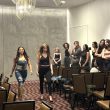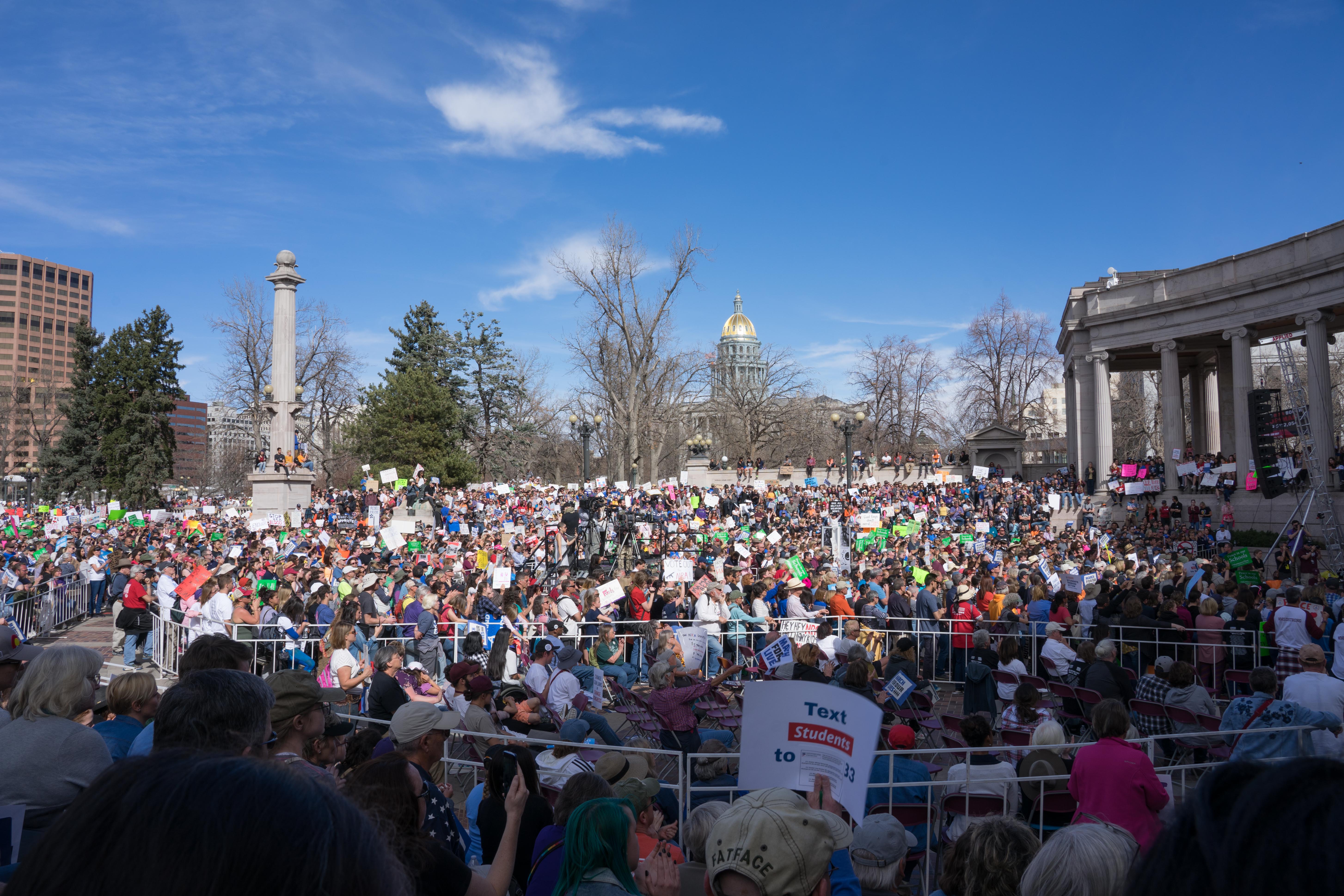“We just want our kids to stop getting shot in schools,” explained Colorado father and teacher Kyle Burch.
And he isn’t the only one. Demonstrators flooded the streets Saturday in cities across the nation in the most aggressive call to action yet from a student-driven movement that emerged after the recent massacre at a Florida high school. And Denver was one of them. Thousands filled Civic Center Park armed with homemade signs, heavy hearts and a deep conviction. People of all ages, ethnicities and backgrounds united at the state’s capital with one solitary mission — to end gun violence.
“After Columbine, nothing happened,” expressed Colorado native and father Steve Riedel. “I was at Columbine, I experienced the dead silence and pure grief that hung in the air that day. I listened to those parents speak after their children were shot in the face. It’s twenty-something years later and nothing has changed.”
The atmosphere Saturday was comparable to the atmosphere that Riedel expressed following the Columbine shooting, silent and heavy. And while, like any protests, there was collective energy fueled by numbers and anger — this march was different, because this time people were marching for the lives of their babies. This was parents marching for their middle schoolers, juniors and seniors marching for their classmates and grandmothers marching for their grandchildren.
“We’re grandmothers,” expressed former teacher and principal Dorothy Schepps. “I was an educator and am now a grandmother and the thought of my loved ones walking into school and fearing for their lives is unimaginable. If I can do something to end that fear just by being here today then I need to be marching.”
Parents, grandparents and former educators showed up Saturday in waves, making it clear that they would no longer allow leadership complacency and stagnant policies to put their communities in danger.
“I want assault weapons out of the hands of civilians,” expressed Together Colorado board member Frank Tapy. “It’s insane that any idiot can buy an assault rifle. There are a great many things that we can do. We need comprehensive reform and gun control and that doesn’t mean we’re taking everybody’s guns away, but the people who shouldn’t have guns need to have those guns kept away from them and we need lawmakers to get off their asses and make that happen.”
Gun control laws in the US have in the past been somewhat stagnant. Following the Florida shooting, a House committee approved a bill that would raise the minimum age to buy rifles from 18 to 21 and creates a three-day waiting period for all gun purchasers. The bill, however, is just “one small step to solve a national crisis,” according to Maddy King, a sophomore at Marjory Stoneman Douglas High School who survived last month’s shooting.
King was one of many speakers from Marjory Stoneman Douglas High School — the most recent shooting location in Florida — to speak in protests across the nation. As she took the stage in Denver’s Civic Center Park Saturday the crowd fell silent and gave their full attention to the teen.
“On February 14, at 2:25 p.m., the fire alarm went off for the second time that day. The difference between this fire alarm and almost any other fire alarm was that almost immediately after it went off, we heard gunshots,” explained King. “My classmates and I went into a panic. We didn’t know what was happening. ‘Who do I know that just got shot?’ I asked myself. ‘Will I make it home?’ I borrowed my friend’s phone to text my mother. ‘It’s Maddy…shooter at school… it’s on the news… I’m safe… I love you.'”
Seventeen students died that day. And this is just one in a slew of mass shootings that have occurred in the US, in recent years. Since Columbine in 1999, more than 187,000 students attending at least 193 primary or secondary schools have experienced a shooting on campus during school hours, according to a year-long Washington Post analysis. Unfortunately, as citizen’s lives are changed by the violence, policies to end it don’t seem to be doing the same. And Saturday’s March for our Lives protests made it abundantly clear that the public is no longer willing to accept thoughts, prayers and complacency. Many calling for reform are in favor of decreasing the public’s access to guns. Some, however, would rather see an increase in those carrying.
If passed, the Florida bill would also create a program that allows teachers who receive law enforcement training and are deputized by the local sheriff’s office to carry concealed weapons in the classroom. A move that King believes is not the solution.
“How do we change this?” She asked the captivated crowd. “How do we stop another school shooting? ‘I can tell you how we don’t…. by caring more about our guns than our children. Arming teachers is not the solution. My 60-year-old science teacher cannot be expected to make any of her shots at a student that she may have taught.'”
The discussion among lawmakers and the community regarding gun regulation is a long-running and heated one. From suggestions of banning bump stocks to arming teachers and tightening background checks — many ideas have been proposed, but not yet acted upon. Regardless of your stance, one sentiment seems to ring true across party lines and opinions. No one should have the feeling of wondering if their daughters and sons are going to make it out of school alive. “This should not be allowed to happen again,” concluded King. “It should not have been allowed to happen in the first place.”
For more information on the #MarchForOurLives Movement visit them here.





